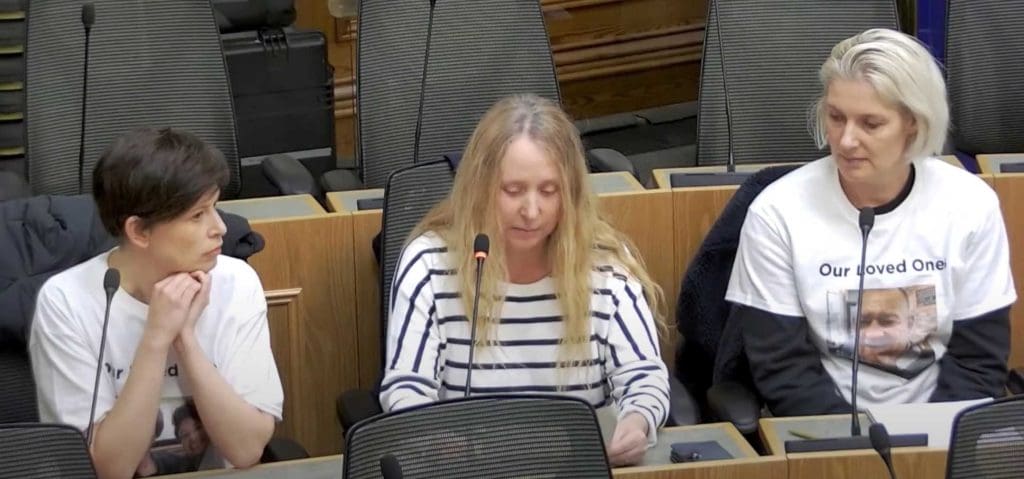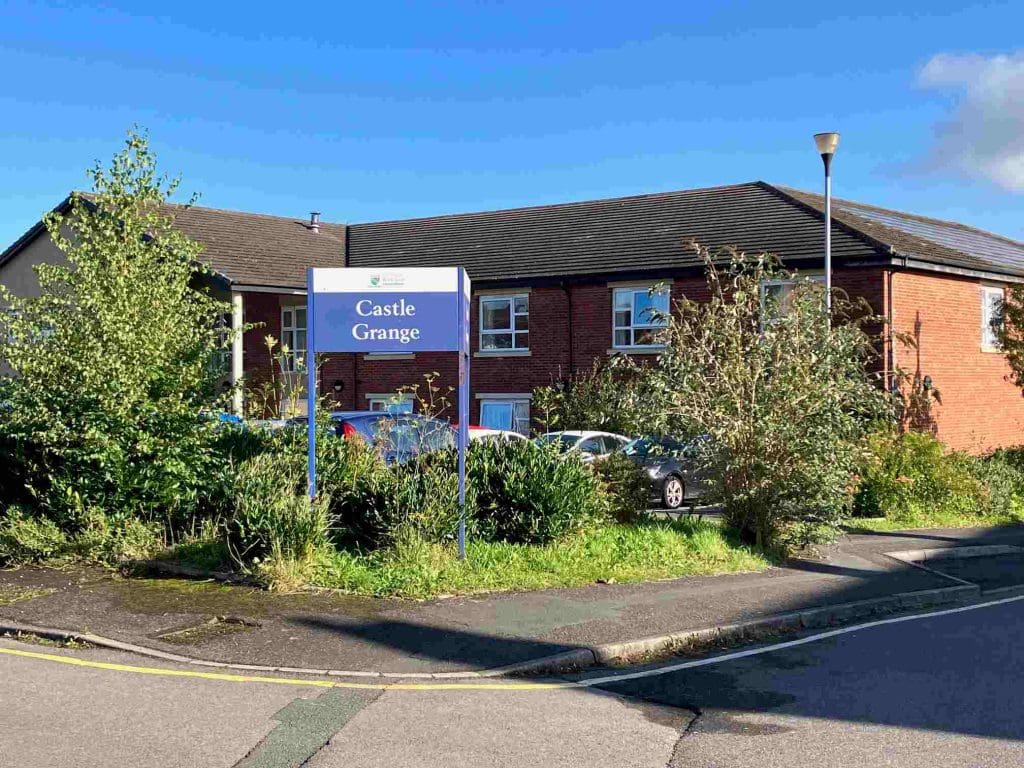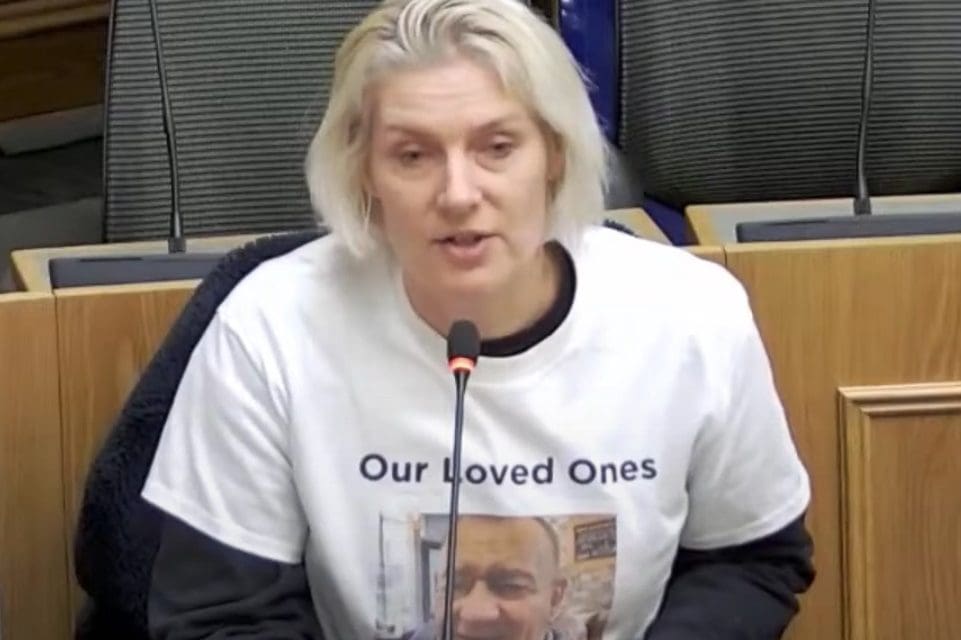Crisis-hit Kirklees Council wants to close down two dementia care homes, Castle Grange in Newsome and Claremont House in Heckmondwike. Here SARAH NEWTON, one of the relatives fighting to save the homes, tells the heartbreaking story of her dad’s dementia journey and how he found a new home from home at Castle Grange.
It all started in 2019 with a phone call from my dad saying: “I’m in Birmingham and I’m lost.”
Dad was on his way back from visiting his girlfriend in Wales and missed the M42 turn-off. He ended up on the M6.
This event was followed by numerous calls asking me how to use the TV remote or the oven. The conversation would last for some 30 minutes or more then often ending with both of us being annoyed at each other.
He had started to have a few falls whilst getting in and out of the bath and his body was black and blue so I’d reached out to social services and we got his bath removed and tele-care equipment put in.
As a family, we had already spoken with dad about getting his memory checked and we were waiting for an appointment just to be safe.
Small things that seemed insignificant at the time, were with hindsight, the start of our dementia journey.
Roll on six months and we are three months into the Covid lockdown. My dad was still living in his own house with support from relatives that lived close by, getting shopping for him whilst trying to abide by the rules.
Then suddenly I get a call from his neighbour to say he’d had a house fire. The fire was confined to the kitchen and thankfully his neighbours were able to get him out safely.
But he didn’t have home insurance so he moved in with me, my husband, 10-year-old son and two-year-old daughter.
Due to the fire and ambulance attending he was made a priority case by the NHS and finally had a scan which discovered Alzheimer’s and vascular dementia.
At the time of the diagnosis, I was blissfully unaware of the full effects of the condition so I watched a recently aired BBC documentary which followed three people and their families living with dementia.
After watching the programme I was somewhat reassured as it didn’t look that hard a condition to deal with, they would forget a little more than normal and want to go out less.
It didn’t sound that bad and my dad had cared for me and my brothers as a single parent. How hard could it be?
Also, it was the very least I could do for him considering the dedication he had shown when we were growing up.
However, in reality, the BBC needed to produce a true to life programme called: ‘Dementia – the Ugly Truth.’

It wasn’t too bad at first. I work full-time as does my husband. I found a local dementia group and arranged with work to do condensed hours over four days.
The kids loved having grandad around the house more. I was able to sort his medication, ensure he was eating on a regular basis and, most importantly, he was in a safe environment.
He was able to have his independence and go round the village on his own. I had reached out to the local pub and explained dad’s condition.
They agreed to serve him non-alcoholic lager as I had read that alcohol makes his condition worse. He was able to maintain a social life with my support.
We had good days and funny days. We would all see the funny side when he dressed as Superman (pants on the outside). It wasn’t until about six months in that we started to see a decline.
I would get concerns raised from the dementia group that he was getting confused wandering into rooms he shouldn’t. It had come to the point that he could no longer be left or go out alone.
I felt a sense of panic and sought advice from the Admiral Nurse organisation. The nurse I spoke to was great and suggested looking into Carers Count.
I immediately applied and my dad was assessed. Thankfully they said they could help and once they had availability someone would call me to arrange assistance for me.
I can remember a feeling of relief at being told this news although it never came to fruition. I still had the pressures of work, juggling kids and home life.
Dad had started to become difficult and his attitude towards me had started to change. Taking tablets had become a negotiation, he believed that I was trying to poison him.
He could not understand when I’d try to explain they were for his benefit. He stopped washing and started urinating in his bedroom. I walked down stairs one morning and stepped in faeces.
My husband, who is fairly laid back, took this all in his stride and we built a downstairs bathroom so that dad did not have to struggle upstairs to use the toilet.
I bought portable urinal bottles and we worked with the NHS to try and make the situation easier for him. Dad was struggling staying at our house, he felt isolated and kept trying to escape.
I was working four days a week and trying to juggle work and family life and the kids running around the house being kids were adding to his anxiety levels.
I managed to arrange for dad to attend Homestead two days a week, which is a dementia day centre. It helped for a while and allowed me to be able to continue working.
It didn’t last long though and, when he was not at Homestead, his temper was getting short with us all and he would call my daughter who, by this time was four-years-old, explicit names.
He would accuse my son of having an affair with his girlfriend and sometimes thought I was his girlfriend and accuse me of having an affair with my husband often throwing his fists at me.
I would scream to myself: “It’s the dementia not dad. Dad loves us.”
I was still working and was out for a works leaving do when my husband called and said I needed to come home.
My dad had left the house after going to hit my son. He’d threatened the neighbour who tried to coax him off the bus.
I was stood in Manchester on the phone to the police. “You have to get someone to Huddersfield Bus Station now! He’s got dementia and doesn’t understand what he is doing.”
I got home to police officers, a confused dad and my children scared.
By this point we would all walk round our home as if we were walking on eggshells. I would plead and shout: ‘Please take your tablets, please go to bed, please get a wash, I’ll help you’ but to no avail.
I’d find myself driving down the road and thinking: “If I just drive into this tree, it would be over.” Selfish, I know, as who would care for dad then?

The Admiral Nurse suggested trying respite, and I suggested a home a short walk from where I live and she made me feel like the worst person in the world.
She explained that care homes often registered to be able to care for dementia but don’t specialise and do it as a bolt on often confining residents to locked suites which would add to dad’s anxiety and not enable a good quality of life for him.
It was at that point she advised I contact Castle Grange in Newsome stating in her opinion it was the only home in the area suitable for my dad.
I was aware of them through daycare and booked dad in. He hated it but I had to do it for my family’s sake.
By this time none of us was enjoying living at home and then we had the news my father-in-law had been diagnosed with the same condition as dad. It was heartbreaking.
Every day was like groundhog-day. Dad was at the point he was up all night; I’d be pleading for him to go to bed so I could sleep.
He hated me as his carer. I started to hate the new him and despise myself for feeling that way. I was living off three hours sleep a night and struggling to function.
My temper was short with anyone who spoke with me. It was taking a toll on us all but most of all my children.
For months I’d been playing piggy in the middle to keep dad away from the kids but it was just too much. My son was scared to be in his own home. That was it. Something had to give. I called Castle Grange to see if that could be his home.
An assessment later and emergency respite was in place. I felt immense guilt but at the same time relieved for my children and family.
But what came next was not easy. Every visit his clothes were packed and he was adamant he was coming back to look after the children.
But there was a positive side too, the aggression towards me had gone and he started to see me in a different light. His eyes had changed from an icy glare to love for his daughter again. He even enjoyed playing with his grandchildren.
I now had a part of my dad back. It may have taken over six months to get him there but we are here and he calls it home. It is his home now and he has accepted that.
Anyone with a loved one with dementia will tell you how difficult and devastating change can be on them.
Increased stress can have a debilitating effect on sufferers. Trauma through relocation can result in behavioural changes requiring additional medication reducing their quality of life, changes to eating patterns that can result in death.
If my dad’s home closes who knows what that will do to him. Will my children and I lose my dad again? I don’t know but I, for one, am not prepared to take that risk.
So, I sit here at the Cabinet meeting with two other family members who also cared for their loved ones and listen to councillors belittle our efforts to keep our loved ones at home.
To talk about those with dementia who can stay at home and discriminate against those who can’t due to safeguarding issues by not including them in the council’s care strategy. Why should our loved ones suffer?
Where my dad lives now is his home. He can freely walk the grounds, floors and interact with other residents. He loves the staff there as family.
As soon as we drive near, he asks: “Am I going home now.” He’ll point to his room and say: “That’s my home there.”
I fear that the council are making this decision even though they know it will kill some of our loved ones, or that it will irreversibly take another piece of them away from us.
I can’t sleep at night knowing this. How can they not realise they need to find another way?
Please note: This is very much an overview of our dementia story. We had some good days and some much worse days in between. I send love and strength to all those caring for loved ones with dementia.


















